
The benefits of high-protein, low carb foods
High-protein, low-carb foods have become popular, thanks to trendy diets like the ketogenic diet, paleo, and Atkins. And the reason why this type of diet—eating foods higher in one macronutrient and lower in another—works for some people often comes down to the fullness factor.
“Typically, protein-rich foods take longer to digest,” says Kristen Smith, RD, an Atlanta-based dietitian and spokesperson for the Academy of Nutrition and Dietetics. “So increasing your consumption of protein-rich foods, increases satiety, and can, therefore, aid in weight-loss because you can become more satisfied by eating less food.” Also, by eating fewer carbs, your body can learn to burn more fat as fuel, while excessive carb intake can cause your body to store more fat, Smith explains.
Research also suggests that a low-carb diet can help increase your daily energy expenditure (or calories burned) when looking to maintain weight loss. And studies back up the fact that eating plans that are high in protein can increase satiety and help control the number on the scale.
But two important caveats come up when you turn mostly to high-protein, low-carb foods. For starters, you still need to pay attention to saturated fat—too much is bad for heart health—and those with kidney disease should probably avoid this plan, Smith says.
Also, without many carbs in your diet, you might start craving ingredients like pasta, bread, and potatoes. “If you follow a diet and it provides results but leaves you feeling unsatisfied or craving more, then it might not be the diet for you,” says Angel Planells, RDN, a Seattle-based spokesperson for the Academy of Nutrition & Dietetics. In other words, make sure you stick to a diet plan that works for you, featuring foods that leave you satisfied, not deprived. For specific ingredient suggestions, we rounded up these high-protein, low-carb foods to add to your meal plan, according to Planells and Smith.

Eggs
Serving size: 1 large hard-boiled or scrambled
6 grams protein; less than 1 gram carbs
Not just a breakfast food, hard-boiled eggs taste great on salads or as a stand-alone snack. Both Smith and Planells recommend it as a top food to choose. (Learn the difference between cage-free and free-range eggs.)

Chicken breast
Serving size: 3 ounces
20 grams protein; 0 grams carbs
An easy addition to salads, grain bowls, or as a main meal, chicken breast will fill you up thanks to that high-protein content. Aim to keep portions the size of your fist to get your fill and use healthier cooking methods (baked, roasted, grilled, etc.) versus frying. (Try our pesto-stuffed chicken breast recipe.)

Ground turkey
Serving size: 3 ounces
23 grams protein; 0 grams carbs
Another poultry product packed with protein, ground turkey offers a lean alternative to many red meats. Plus, you can put it in tacos, breakfast hash, or turn it into healthy burgers.
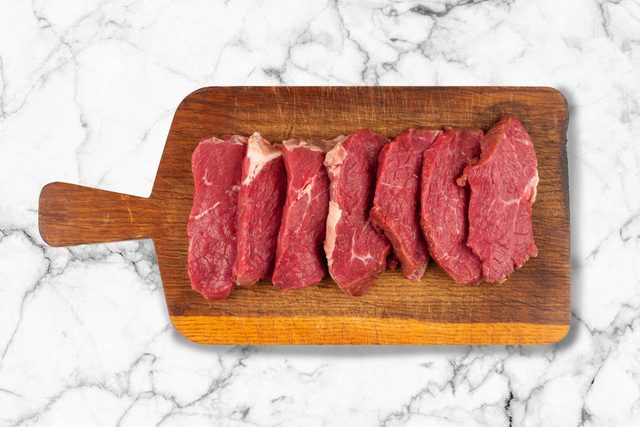
Lean beef
Serving size: 3 ounces
25-30 grams protein; 0 grams carbs
Look for cuts with less fat, like sirloin or top round roast, says Smith. This cuts down on the saturated fat while keeping protein high. Read more about the best meats to eat and the ones to avoid.
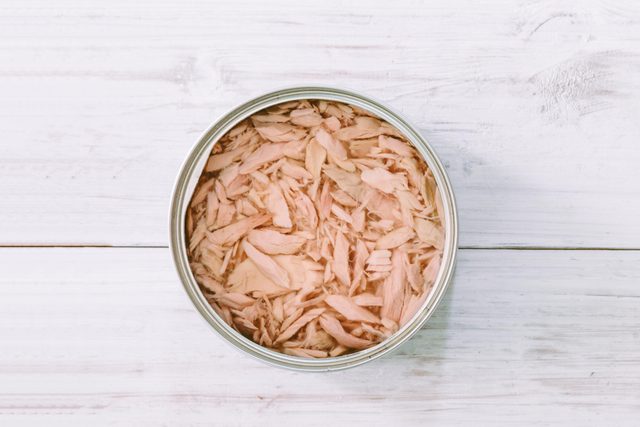
Canned tuna
Serving size: 3 ounces
20 grams protein; 0 grams carbs
This is a convenient source of protein, because there’s no cook time. Opt for tuna canned in water and you get all of the protein, without all of the fat from oil. In just three ounces, you’ll find less than three grams of fat. (Here’s a healthy tuna salad recipe.)
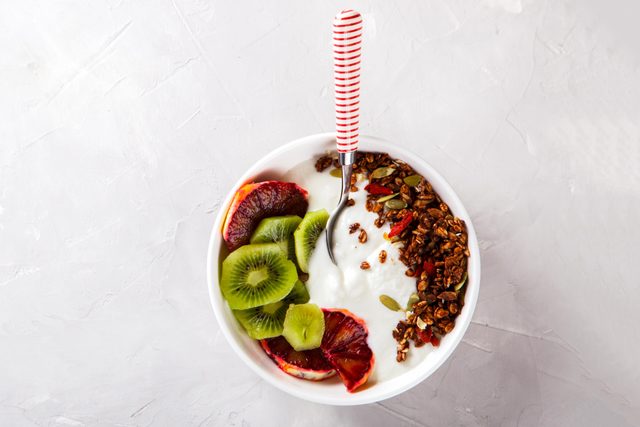
Greek yogurt
Serving size: 1 container (about 7 ounces)
20 grams protein; 8 grams carbs
It’s best to go for a plain flavour than those filled with fruit (aka sugar), as that will cause the carb content to skyrocket. Add your own seasonings, like cinnamon, a little dash of almond butter, or try one of these Greek yogurt breakfast ideas.

Peanuts
Serving size: 1/4 cup
9 grams protein; 6 grams carbs
Toss peanuts in a trail mix or eat them right out of the shell, just make sure you check the sodium on the label. The same goes for peanut butter. Look for labels with no sugar, salt, or oil added, Smith says. (Try our peanut butter smoothie recipe for a post-workout treat.)

Broccoli
Serving size: 1 cup
3 grams protein; 6 grams carbs
If you’re looking for a veggie that offers a few more grams of protein than others, this green will do the trick, says Planells. While it is higher in carbs, it’s important to eat non-starchy greens, so keep it on your list of go-to foods when going high-protein, low-carb. (Also, check out the foods that have more fibre than broccoli.)
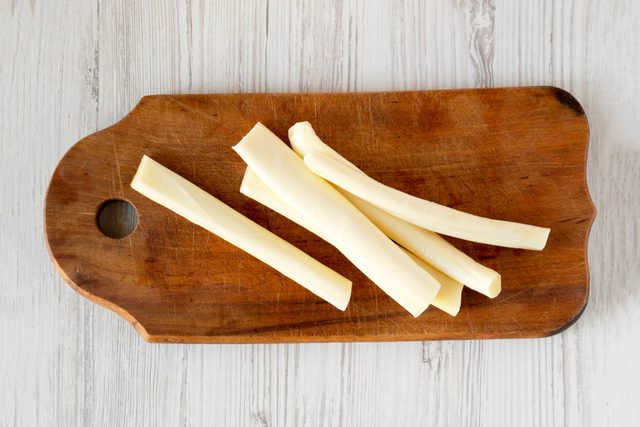
String cheese
Serving size: 1 package (typically 24 grams)
7 grams protein; 1 gram carbs
Grab a stick of mozzarella as a protein pick-me-up when you’re on the move. It’s the perfect savoury snack, says Smith. The hit of fat content will help keep you full, too. (Here are other low-cal cheese options.)

Tofu
Serving size: 1/2 cup
10 grams protein; 2 grams carbs
Get your fill of high-protein, low-carb foods with an animal-free ingredient. This option, made of soy, offers a high serving of plant-based protein.
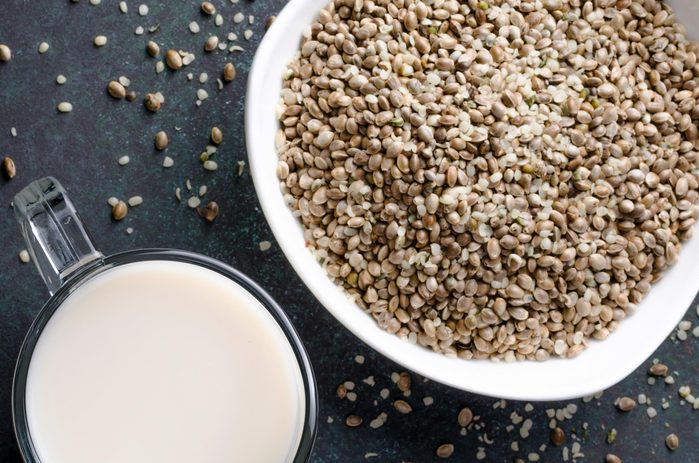
Hemp seeds
Serving size: 3 tablespoons
10 grams protein; 3 grams carbs
Easily tossed into a salad or on top of soup, these little seeds add a slightly nutty flavour and crunchy texture to any dish. Try our hemp-seed salad recipe or our hemp cookie recipe.)

Hummus
Serving size: 1 tablespoon
2 grams protein; 5 grams carbs
Made of protein-rich chickpeas, hummus offers a dash of the macronutrient in each dip. Check your ingredient list to make sure you recognize what’s on the label before you buy. (Try our sumac-spiced hummus recipe.)
Next, learn why low-carb diets may not be right for you.
